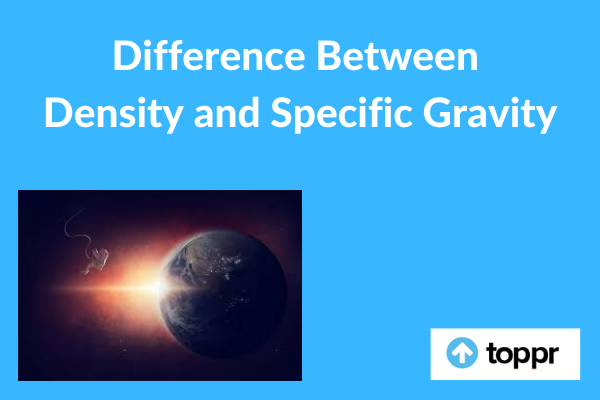Specific gravity is using the expression of density in relation to the density of some standard or reference. Usually, water is a standard reference. Whereas, density is represented in the units for weight relative to the size. It is noteworthy that specific gravity is a pure number which is having no dimension. It may be interesting to find out the difference between density and specific gravity in many circumstances. Density is the specific property of matter and it uses the ratio of mass to the volume of matter. On the other hand, specific gravity or relative density is the measurement of density with respect to a density of pure water. This article will explain these two terms with the difference between density and specific gravity.
What is Density?
One can define the density as the property of matter and also as the ratio of mass to a unit volume of matter. It is typically represented in the units of grams per cubic centimeter or kilograms per cubic meter. Its computation is through the mass per unit volume. Thus, density is the measurement of a material’s or object’s compactness. It is a scalar quantity as it does not have the direction. Its measurement is a way to define the mass in a continuous system.
What is Specific Gravity?
It is the measurement of density relative to the density of some standard reference substances. The reference material is generally pure water. Also, if a material has a specific gravity less than 1, then it can float on the water. One can compute the specific gravity of the substance by the simple ratio of the density of the substance with the density of the standard substance.
Thus specific gravity is the density of a substance or liquid in comparison to the density of water at a given temperature and pressure. Therefore any change in temperature and pressure will definitely affect the density.
Difference between Density and Specific Gravity

Difference Between Density and Specific gravity
The important difference between density and specific gravity
| Parameter | Density | Specific Gravity |
| Definition | It is the ratio of the mass of the substance to the volume of the substance. | It is the ratio of the weight of the substance to the weight of the same volume of water. |
| Computation | To compute the density, one will need to know the weight and volume of the given substance. | To compute the specific gravity, one has to divide the density of the substance with the density of water. |
| Representation | It is represented as the absolute term, with some dimension. | It is represented as the relative term without dimension. |
| SI unit | It has the SI unit. | It has no SI unit. |
| Application | It is useful for many measurements in science as well day to day life. | It is useful in the industries to measure the concentration of solutions. |
Conversion between the density and specific gravity:
Specific gravity values of the substance are not very common in day to day life. Although it is very useful for predicting whether or not something will float on water. Also, it is useful for deciding whether one material is more or less dense than another. As the density of pure water is almost 1 gram per cubic centimeter. Therefore specific gravity and density are almost the same value. Actually, density is very slightly less than the specific gravity value.
FAQs about density and specific gravity:
Q.1: What are some applications of specific gravity?
Solution: Some major applications of specific gravity are as follows:
- The purity of the gem can be determined by comparison of specific gravity with the patron number high purity level. This helps to find out the gem’s value very quickly.
- Engineers can find out the soil’s compressive strength for taking decisions during construction. Actually, specific gravity and compressibility are well connected with each other.
- Crude oil and its refined products are normally measured in terms of volume in gallons or by the weight in tons. The specific gravity of the oil can be measured by the relationship between volume and weight
Q.2: What are the densities of water at some different temperatures?
Solution: 1. At the 32 degrees Fahrenheit temperature, the density of water is 915 kg per cubic meter.
- At the 39 degrees Fahrenheit temperature, the density of water is 1000 kg per cubic meter.
- And at 176 degrees Fahrenheit temperature, the density of water is 971.8 kg per cubic meter.
Reference:
https://en.wikipedia.org/wiki/Relative_density






hey do you guys knows what is cconcave
nope